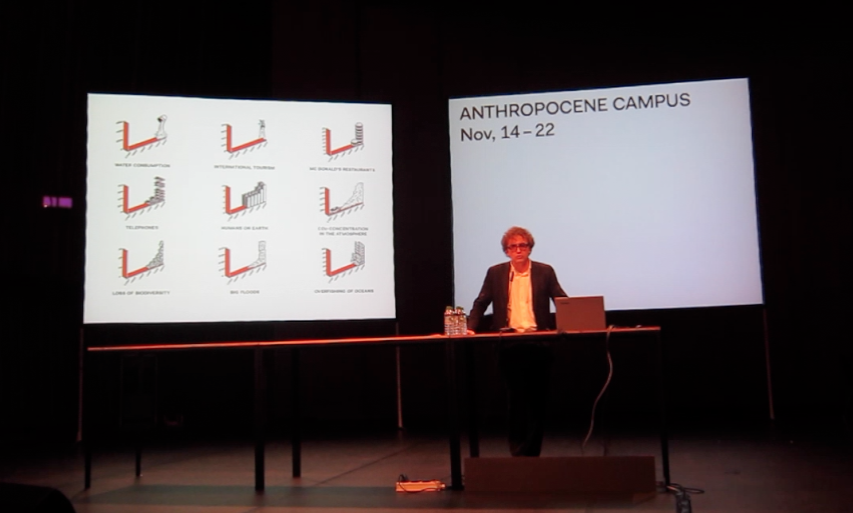
Anthropocene Campus, Inaugural Speach by Bernd Scherer, Director of Haus der Kulturen der Welt, Berlin, 14 - 22 November 2014. All photos of this article by Stella Veciana.
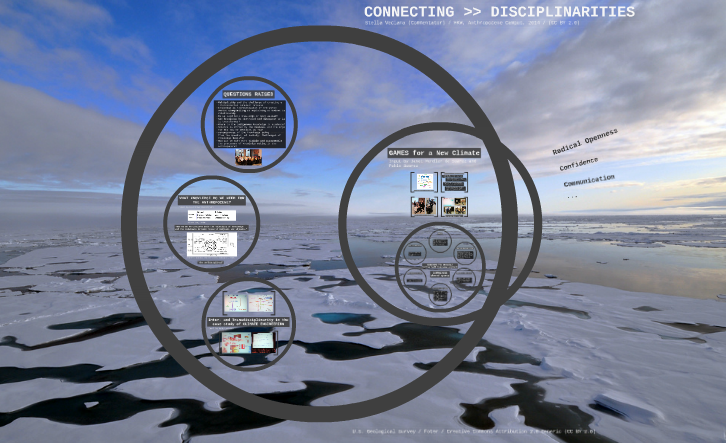
DISCIPLINARITIES Prezi-Presentation. Stella Veciana. Anthropocene Campus, Haus de Kulturen der Welt, Berlin, November 19 th, 2014.
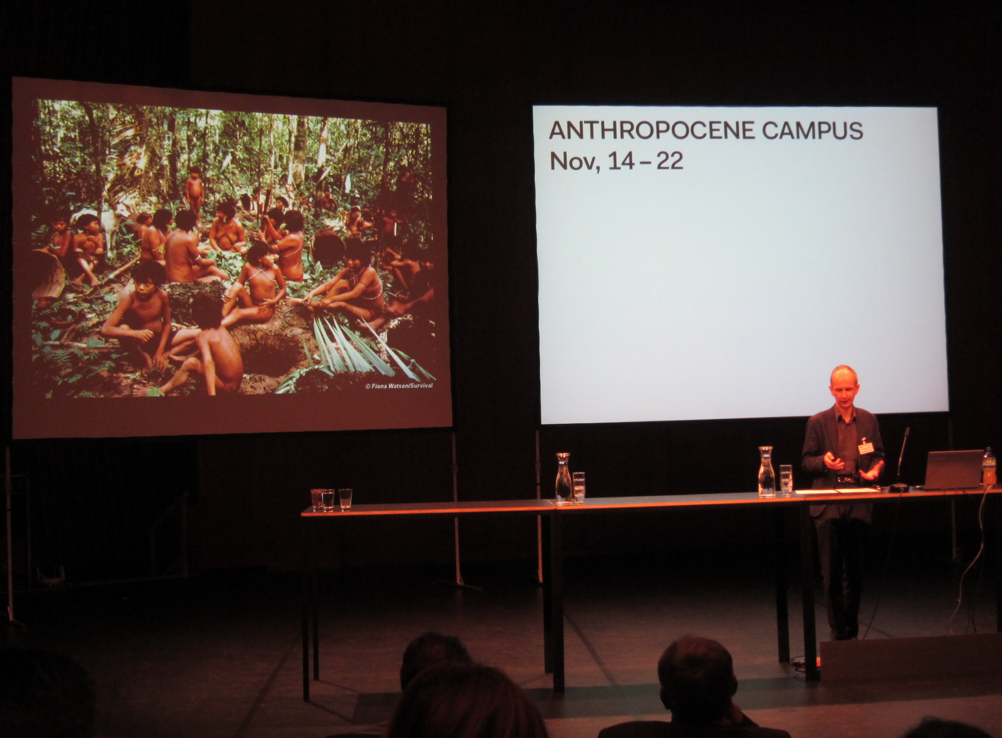
Bronislaw Szerszynski. Introduction into "Disciplinarities" Seminar. The seminar was presented by Bronislaw Szerszynski (Department of Sociology, Lancaster University) and co-developed with Mark Lawrence (Institute for Advanced Sustainability Science, Potsdam) and Wolfgang Schäffner (Cluster of Excellence “Image—Knowledge—Gestaltung .Commentator: Stella Veciana. An Interdisciplinary Laboratory,” Humboldt-Universität zu Berlin). Anthropocene Campus, Haus de Kulturen der Welt, Berlin, 14 - 22 November, 2014.
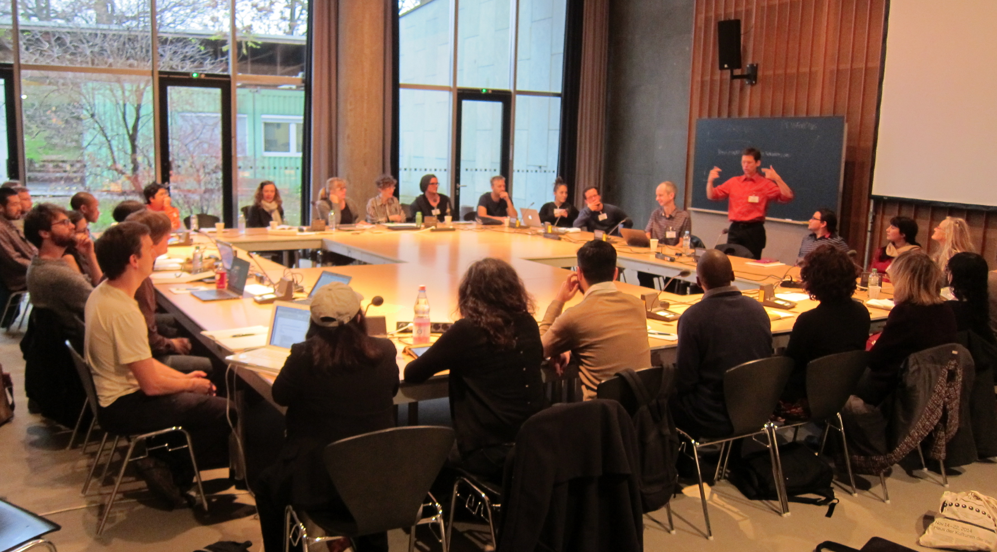
Mark Lawrence. Input during Disciplinarities Seminar. Anthropocene Campus, Haus de Kulturen der Welt, Berlin, 14 - 22 November, 2014.
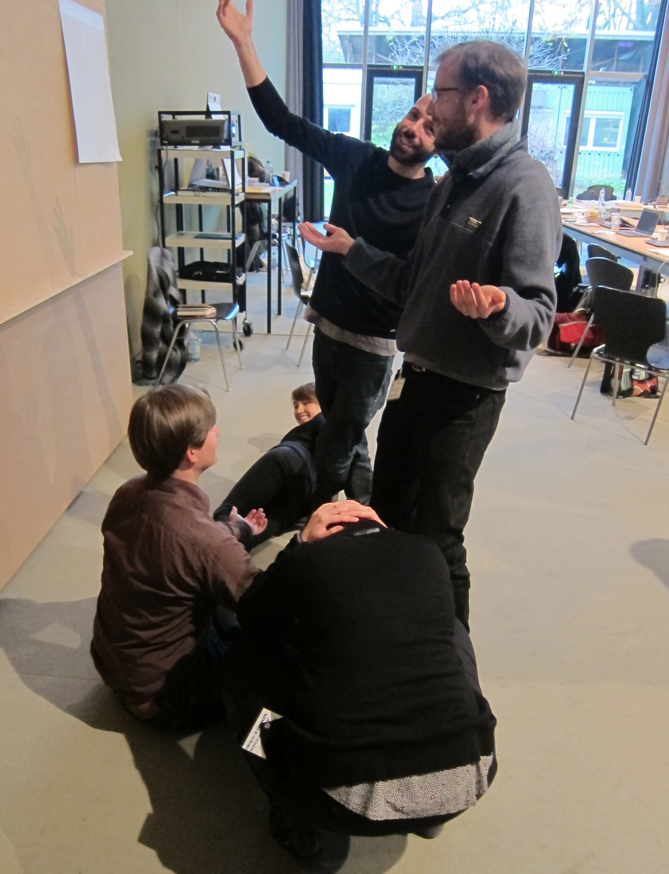
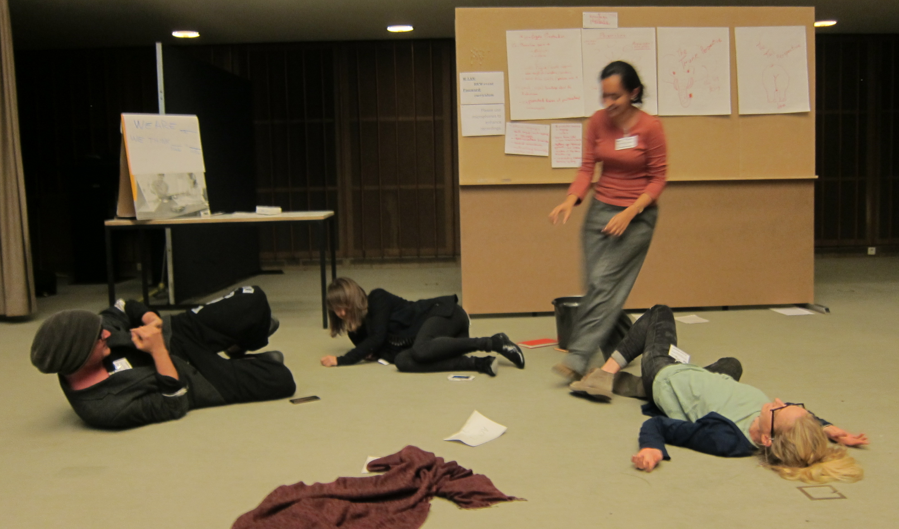
"Games for Climate Change" by Janot Mendler de Suarez and Pablo Suarez during Disciplinarities Seminar. Anthropocene Campus, Haus de Kulturen der Welt, Berlin, 14 - 22 November, 2014.
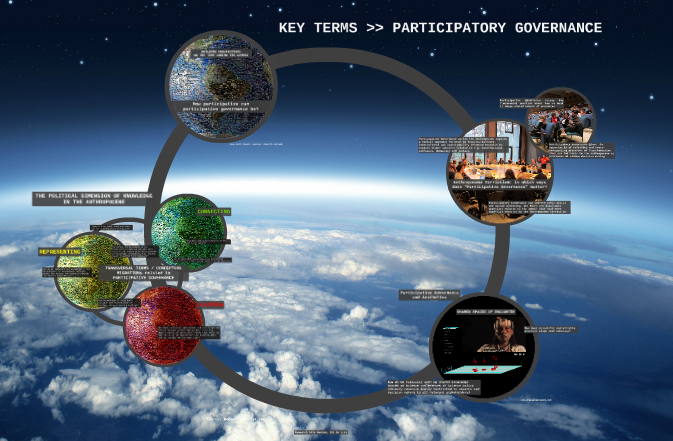
PARTICIPATIVE GOVERNANCE Prezi Presentation. Anthropocene Campus, Haus de Kulturen der Welt, Berlin, November 22nd, 2014.
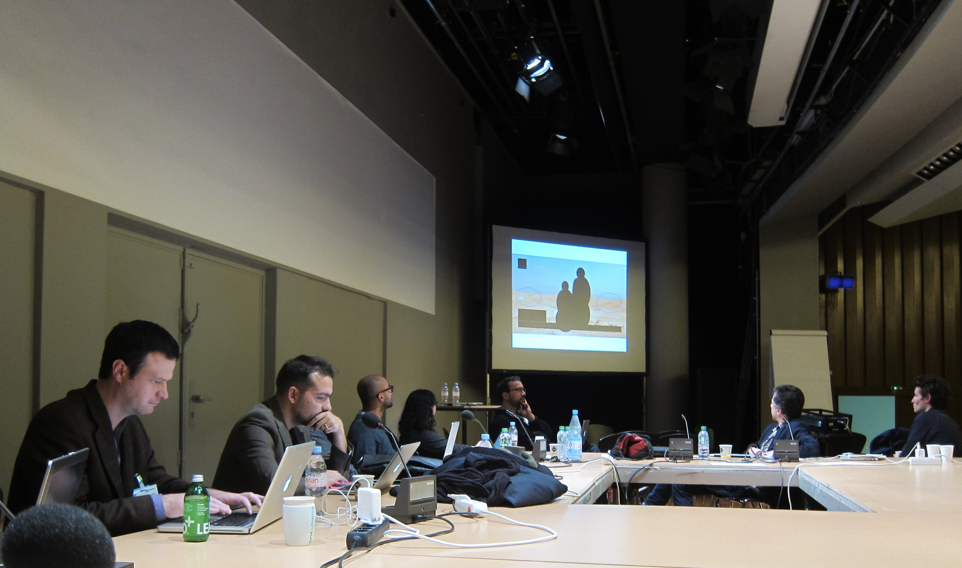
Eyal Weizman. Presentation during the "Geo-Politics" Seminar. Anthropocene Campus, Haus de Kulturen der Welt, Berlin, November 22nd, 2014.
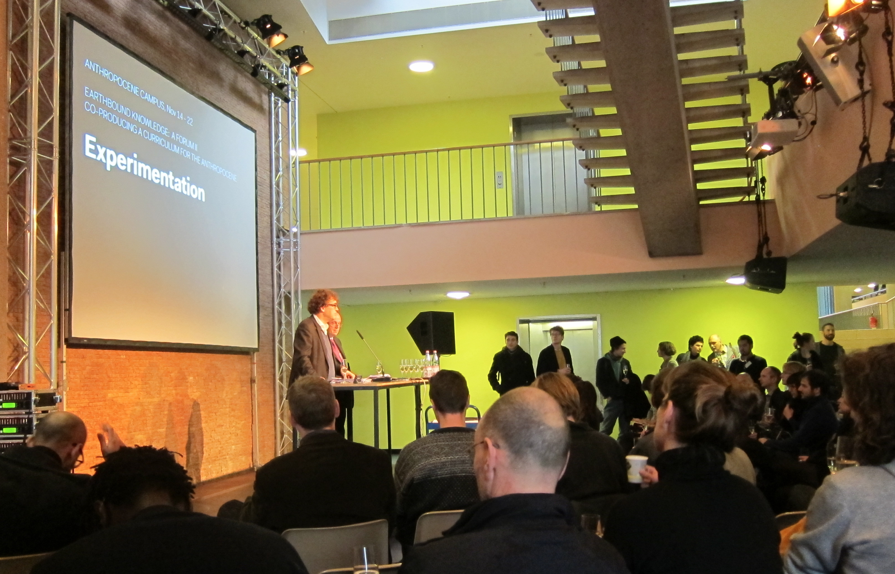
"Experimentation" Final Podium Discussion. Anthropocene Campus, Haus de Kulturen der Welt, Berlin, November 22nd, 2014. All photos of this article by Stella Veciana. |
»Anthropocene Campus«
Stella Veciana
Transdisciplinary practice confronts us with methodological challenges. We need shared spaces to discuss new methodologies of integration; especially methodologies that integrate academic and practical knowledge are fundamental. Besides the challenges that result out of the transdisciplinary practice itself, there are also the institutional ones related to the lack of a necessary research framework for science and civil society, a corresponding curriculum, research agenda and funding programs.
One of the most outstanding experimental approaches to co-create a common curriculum beyond disciplinary and cultural barriers was recently carried out during the »Anthropocene Campus« where I was invited as commentator and speaker. The Campus was organized by Haus der Kulturen der Welt (HKW) in cooperation with the Max Planck Society, Deutsches Museum, the Rachel Carson Center for Environment and Society, and the Institute for Advanced Sustainability Studies. During the Anthropocene Campus new experiences and methodologies, were presented and discussed to contribute to foster a transdisciplinary ‘work in progress’ Anthropocene curriculum. More than 100 young academics, artists, and cultural, theorists and representatives from the fields of education, policy, art and research participated among them Marco Armiero, Amita Baviskar, Elena Bougleux, Arno Brandlhuber, Miriam Diamond, Paul N. Edwards, Erle Ellis, Sabine Höhler, Pablo Jensen, Natalie Jeremijenko, Adrian Lahoud, Mark Lawrence, Reinhold Leinfelder, Wolfgang Lucht, Ioan Negrutiu, Philipp Oswalt, Armin Reller, Jürgen Renn, Libby Robin, Wolfgang Schäffner, Sverker Sörlin, Will Steffen, Bronislaw Szerszynski, Helmuth Trischler, Eyal Weizman, Jan Zalasiewicz.
Following are two presentations given at the Anthropocene Campus: first, a summary about the questions raised in the “Disciplinarities” seminar which was part of the three topical clusters called “Connecting” (the correlations between environmental conditions, society, and technological development). The other main domains of co-production of a Curriculum for the Anthropocene were “Representing” (from the medial and scientific representations of the Anthropocene) and “Claiming” (the sociopolitical impacts of the “Age of Humanity”). Secondly, the view on one of the main concepts for an anthropocenic knowledge: “Participative Governance” that were discussed during the concluding sessions among other key thematic foci as public knowledge, limits of knowledge, experience as knowledge, complexity, design, earthly ethics, scale, monitoring and experimentation.
DISCIPLINARITIES
Seminar. Anthropocene Curriculum. HKW, 19.11.2014.
Here we are, somewhere in between the earth and the sky, trying to
get the Big Picture, figure out how to address the problems of the Anthropocene,
learn new habits and practices of knowledge production, and CONNECTING the DISCIPLINARITIES by combining knowledge from diverse disciplines across the natural and social sciences, and the arts and humanities.
I had the pleasure to assist to a very inspiring seminar that explored what kind of knowledge we need for the Anthropocene and the notions of inter- and transdisciplinarity in the case study of the Climate Engineering. We discussed the questions raised but more significantly experienced the complexity of these matters through “inhabited games” that allowed the participants to collectively inhabit a complex system.
So let me begin with the introduction given by Bronislaw Szerszynski about the question of what kind of knowledge we need for the Anthropocene. Perhaps one of the best known knowledge typology is that of Alice Lam, which sees knowledge as extending in two dimensions: explicit-tacit and individual-collective. The interplay between these dimensions gives rise to four categories of knowledge, as follows:
- Embrained knowledge, then, is formal, abstract and conceptual knowledge. It is general, conscious and explicit and is the result of individual acts of cognition.
- Embodied knowledge also resides primarily within individuals, but is applied, practical, bodily, context-specific and largely unconscious. Embodied knowledge is about doing rather than knowing.
- Encoded knowledge is the collective, conscious knowledge of an organisation or society which has been codified into language or information – rules, standards and systems – which then regulate behaviour.
- Embedded knowledge is also collective, but instead of residing in an explicit code is tacitly embedded in social practice and a community’s shared beliefs and norms. Embedded knowledge is relation-specific, contextual and dispersed.
There were several questions raised by Szerszynski such as: how do we re-conceive both the object(s) of knowledge and the relations between research subjects and objects. Or as “we get excited about the synaptic idea of inter/transdisciplinarity, we have to rethink what happens then: how do different forms of knowledge convey, which are the gains or losses?”
The second introduction was given by Mark Lawrence about Inter- and Transdisciplinarity in the case study of CLIMATE ENGINEERING. As it is described in the IASS factsheet, “Climate engineering (CE), also known as geo-engineering, describes a diverse and largely hypothetical array of methods for manipulating the global climate in order to moderate or forestall some of the effects of climate change. CE methods aim either to remove carbon from the atmosphere and store it, or to reflect some of the incoming sunlight back into space. The former techniques are known as Carbon Dioxide Re-moval (CDR), and focus either on enhancing existing carbon removal processes in natural systems (e.g. soils, forest and oceans), or on filtering carbon out of the atmosphere with technological means.
The latter techniques, known as Solar Radiation Management (SRM), focus on increasing the reflectivity of existing surfaces (clouds, forests, deserts, oceans, urban areas), forming a reflective particle layer in the middle atmosphere, or deploying mirrors in space.”
Out of this presentation different challenges related to climate engineering were raised as the need to get different disciplines involved in iterative inter-disciplinary exchange processes
or how the planetary-scale intentional interventions are related to the images of the daily “Quick fixes”. Among many others also: which techniques are discussed? and, who is going to decide on its implementation?
Out of these inputs a lively discussion did arose about
- Multiplicity and the challenge of creating a interconnected coherent process
- Knowledge as representation of the world versus storytelling as explaining ourselves in relationship
- Do we need more knowledge or more access?
- Can knowledge be destroyed and disappear or is it transformed?
- Where is the indigenous knowledge in academia?
- Science is driven by the newness, and the urge for the new by emotions as fear
- consequences of the knowledge being separated from the speaker, of society. Challenges of knowledge transfer
- How can we make more visible and accountable the processes of knowledge making in the Anthropocene?
Most outstanding of the seminar was how these complex issues were given a collective shared space, a space of experiencing the complexity of future risks by and Janot Mendler de Suarez and Pablo Suarez. The approach followed were “inhabited games” as the “discipline slam” or the “discipline snap!”. Particularly stimulating were two further games. One game proposed to perform burning issues, which lead to the experience of the embodied knowledge, the other game engaged the participants to dramatize the “Principles of Collaborative Knowledgemaking”, and into the experience of embedded knowledge. All in all, theses experiences related to rendering the invisible, of making visible the tacit knowledge, whether it is individual (embodied) or collective (embedded).
The games followed the methodology of the “games for climate change” (Suarez et al, 2012) that address all stages of the risk management framework: problem/context, understanding risks, identifying and evaluating options, making decisions, taking action, evaluation. In the seminar the "inhabitable games" let players collectively inhabit a complex system and share the "AHA" moments, which inform mutual learning and set the stage for a dialogue. As a game outcome, collective intelligence reflects a highly contextualized co-generated understanding of the dynamic functioning of a particular system.
These experiences were further developed by the task of “rendering the invisible” in a film storyboard. The six groups came up with the following ideas:
1. Compassion and Connectedness Group: THE KEYNOTE
2. Creative Experience Group: ANARCHIVE
3. Practices of the Self Group: MOLLY
4. Sharing Group: DIS/UTOPIA
5. Radical Education Reform Group: SPACESHIP SCHOOL
6. User based knowledge platform Group: HOSPITABLE ANTHROPOCENE
The main aim of the seminar to learn new habits and practices of knowledge production was fruitfully accomplished by proposing participative excises. These group experiments allowed the participants to experience the embodiment of their knowledge and by doing so making explicit non-knowledge in all its diverse forms.
I want to finish this presentation by saying that I really think this seminar truly addressed key issues for the Anthropocene Curriculum such as:
- How do we develop towards a responsible knowledge production?
- How do we deal with planetary-scale intentional interventions and who is going to decide on its implementation?
- How do we share knowledge, which kind of collective shared spaces we need for this exchange and
- how do we transmit implicit knowledge or experiences, how we make tacit knowledge explicit.
PARTICIPATIVE GOVERNANCE.
Panel and public discussion. Anthropocene Curriculum. HKW, 19.11.2014.
First I will talk about the process of building perspectives at the Campus. And more particularly how these viewpoints evolved around the question of How participatory can participatory governance be?
Participatory governance is a concept that is receiving increasing prominence. However, there is a controversial discussion whether participatory governance is beneficial or detrimental to democracy.
Let me quote a definition out of the Working Paper (264 July 2006) of the Institute of Development Studies (IDS):
"Participatory governance focuses on deepening democratic engagement through the participation of citizens in the processes of governance with the state. The idea is that citizens should play more direct roles in public decision-making or at least engage more deeply with political issues. (Government officials should also be responsive to this kind of engagement.) In practice, participatory governance can supplement the roles of citizens as voters or as watchdogs through more direct forms of involvement." But how participatory can participatory governance be?
Participatory governance relates to the political dimension of knowledge in the Anthropocene. As Bernd Scherer stated: “all knowledge has a political dimension” referring to the Anthropocene as a political statement that leads us to the necessity of new political and social action.
The Anthropocene as a term is already being used by the scientific advisory policy bodies, as in the 2011 Report of the German Scientific Advisory Council on Global Change WBGU. In a speech held last year, by the Secretary General of this Council, Dr. Inge Paulini, ("Consequences of the Report of the German Bundestag's Study Commission Growth, Wellbeing, and Quality of Life") refers to the Anthropocene as a fundamental political field of action, which makes "a transformation toward a climate-friendly and sustainable society very urgent."
During the Anthropocene Campus different aspects of the relation of the Anthropocene with this political field of action were discussed. In the seminars, specific transversal concept came up and were discussed e.g. by sort of “conceptual migrations”, by analysing for instance the meaning of governance in different contexts. In the seminar “Disciplinarities” of the CONNECTING dimension, the concept of governance was raised within the case study of climate engineering: “Which technologies are discussed in climate engineering and who is going to decide on its implementation?”, “How to deal with planetary-scale intentional interventions from a global governance perspective?” And “How knowledge is made more visible and accountable to support science policy making?
This last question is closely linked to the dimension of REPRESENTING discussed in the seminar “Slow media” from the perspective of “How to link head, hand and heart in our communication practices?”, “How do we implement the knowledge of the Anthropocene in pedagogical outcomes within the museum, for instance through “collective experiments” that address political issues linking all stakeholders? This question again relates to the dimension of CLAIMING. More specifically, there was a very intense debate in the seminar “Geo-Politics” about the concept of activism and it’s conceptual migrations: How the term of activism has been translated and how has it evolved in different ways in the United Kingdom or in Germany?
Thew concept of activism gave raise to diverse conceptual migrations: as the notion of activism related to pro-activism, referring to the conceptual transfer from the political to the entrepreneurial context, or other semiotic shifts as activism being understood as a critique of passivism. This lead to problematize the role of civil society organization in politics: “How does activism, governance and participation relate to each other?” Within this context Eyal Weizman made a very thought provoking comment stressing the issue of the intrinsic problematic of NGOs activism being constrained to a permanent restlessness due to their funding conditions. But more importantly he referred to the irresolvable nature of the claims for instance for justice that can be defined conceptually but cannot be archived once they become materially articulated, as political claims hold the contradiction of asking for the unachievable and achievable on the same time.
How can this double nature of claiming be related to participative governance? Let me introduce with the following the proposition of rethinking our shared spaces of encounter, raising the question of the US and of new approaches of creating a connectedness between US that try to address the question of how we share knowledge and how we integrate it into a responsibility driven collective action. This takes me to relate the concept of Participative Governance with Aesthetics. The questions that I try to address from my artistic research practice are linked to:
How do we apply participative governance in the Anthropocene? How do we introduce more participative practices and structures within the scientific system? How do we apply participative governance in the Anthropocene? How do we radically open up shared knowledge spaces as science conferences or science policy advisory councils mostly restricted to experts and decision makers to all relevant stakeholders? What konf of shared spaces of encounter do we need to align scientific and artistic practice with advocacy?
Trying to address these questions I developed in collaboration with Dan Norton “The Challenge Yasuní Platform” (challengeyasuni.net), a platform that connects specialist knowledge from a continuous series of transdisciplinary conferences. Art installations are used to bridge these conferences and present concepts for sustainable alternatives. The processes of linking and mixing are used to build a common space for radical approaches to the global challenges of democracy, climate, resource extraction, the economy, etc.
One of the main elements of “ChallengeYasuní” project is a growing archive of video interviews that are presented using an interactive software. Keywords and transversal terms that are present in each interview sequence can be accessed directly via a dropdown menu system. Similar themes and references from specialists can be compared and contrasted. Knowledge locked in long narratives can then be easily identified, selected, and mixed.
This artistic approach allows viewers to rapidly synthesize alternative positions, by mixing expert opinion. The mix offers a manner to bring the (inevitably) defended expert opinion into play within an undefended space. The simple creative information behaviours of selecting and mixing, when facilitated in a system for viewing video, balances the user between reader and writer; between learning new information and creating new information.
Anthropocene Curriculum: in which ways does “participative governance” matter? Participative Governance
- implies (within the Anthropocene) a radical openness fostered by transdisciplinary, intercultural and sustainability oriented research to explore deeper concerns related to e.g. international conflicts, democracy and justice.
- gives the opportunity of reframing and cross-perspecting processes of transformation that are intrinsic to the Anthropocene. It raises questions related to the processes of decision making from the local to the global scale, to processes of archiving consent related to the use of limited resources and planetary boundaries.
- can improve civic skills and social wellbeing, but there are debateable questions related to the impact on input-legitimacy and effectiveness in, i.e. reaching the goals of enforcing sustainable development that need to be researched within the Anthropocene Curriculum.
- raises the fundamental question on how we want to shape shared spaces of encounter and integration.
- presupposes the fostering of hybrid profiles (as Roger Malina calls them) being educated in different fields of knowledge, which are embedded in plural world views and inhabited in diverse living conditions.
Concluding, I think that the Anthropocene Campus has contributed significantly to stimulate this hybridisation bringing together passionate scientists with analytical artists that in my opinion lead to transform our self-perceptions. And here I just want to mention the proposal that was raised during the Campus “to conceive ourselves as indigenous” getting beyond of the excluding use of terminologies and to focus more on our common concerns about the Earth by finding new ways of how we want to live together by shaping a participative governance that is beneficial for all of us.
|